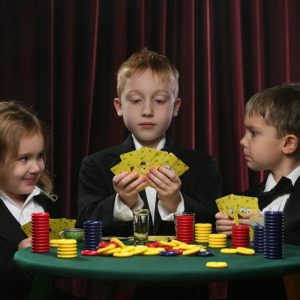Best Poker Games to Teach Kids

If you’re a poker player and a parent, then at some point your child has wanted you to teach them how to play. We are not here to tell you whether you should or shouldn’t teach your children poker. That’s a personal decision that only you can make.
Instead, we are here to give you some ideas about which games you should teach them once you think they are ready to learn. Today, we give you the best poker games to teach kids. Which game you pick will depend on how old your child is and their ability to pick up the concepts of the games.
Five Card Draw
Five Card Draw is my personal standby to teaching anyone, especially kids, how to play poker. This game is great for two reasons. First, it gives kids the chance to physically interact with all the cards they are playing. Children are generally tactile learners, and experiential learning tends to be the best.
Doesn’t get much better than that when you are playing five card draw. #Lucky pic.twitter.com/5TyKLmyNFA
— Brenda Cassellius (@BCassellius) December 25, 2019
Five Card Draw forces players to make poker hands. It also works on decision-making skills. You get five cards, decide which to swap out, and then you make your best five-card hand after the draw. When starting to play, I usually show kids the hands that are possible to make during the game. This gives them a visual example they can remember when playing the game.
Don’t focus on betting in the beginning, but rather on making hands and decision making. Often, I will play Five Card Draw without betting so kids can learn the game. They still have a ton of fun because the game plays so fast and you either win or lose. You then can move on to the next hand.
Seven Card Draw
When is the last time you played Seven Card Draw? Some of you may have never played the game. The object of the game is the same as Five Card Draw, but with two extra cards. Think of it as the Five Card Omaha of the Draw poker world.
Again, this is another game I like to use with kids as they can interact with the cards. I generally play it with a maximum four-card drawing rule. This forces kids to make decisions on which hands to play or keep. Since they get seven cards, they have more options for drawing. This helps them work on their hand building.
This game is often popular with kids because they get more cards and they generally can make better hands. Focus on the fun aspect rather than dealing in the beginning.
Iron Cross Poker
Somewhat of an oddball game, Iron Cross Poker is not played in casinos but is a fun exercise for kids. You get five cards and you make the best five-card hand using the cards on the five card board and the cards in your hand. The board is made to look like a cross, therefore the Iron Cross name.
Ever played Iron Cross poker? Check out this piece from @PokerTraditions about 10 poker variants you may not have heard about. #poker #HomeGamePoker – https://t.co/sW3zfVClby
— James Guill (@compncards) August 11, 2019
If you play Iron Cross, you can play with or without wild cards. The center card is wild along with any of the rank. This is another game that helps with hand building. This is a good game for introducing wild cards and builds a bit of excitement as you don’t know which cards are wild until the end.
Seven Card Stud
Some of you will be surprised to see Seven Card Stud as a game to teach kids, but it is a good game to help kids learn basic concepts of poker. For starters, it can help children learn card memorization. You can even make a game of it. Quiz your kids on which card someone folded on third street.
Next, you can teach kids how to place opponents on hands. Since they can see up to four cards of their opponent’s hand, they can get a good idea of what they may have. They can also evaluate their own hand to see if it is good enough to play.
This is also a good game to introduce betting since there are five betting rounds. Keep things in limit betting format to start with.
Keep Things Simple – Avoid Hold’em
Your kids may see you play a lot of Texas Hold’em, but often kids will get bored quickly when Hold’em is the first game they learn. There’s not a lot to do for kids, and if they aren’t making hands, the game will get boring fast.
If your child is a bit older or has watched you play the game a lot, you can try Hold’em, but if you find their attention waning, then switch to one of the games listed above. Poker is supposed to be fun, so keep it fun. This will help your kids fall in love with the game and graduate to Hold’em and other poker games.
